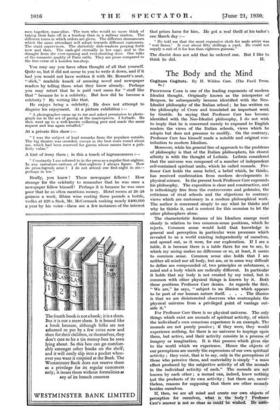The Body and the Mind
PROFESSOR CARR is one of the leading exponents of modern Idealist thought Originally known as the interpreter of
Bergson, he subsequently became identified with the Neo- Idealist philosophy of the Italian school ; he has written on the philosophy of Croce and translated an important work by Gentile. In saying that Professor Carr has become identified with the Neo-Idealist philosophy, I do not wish to imply that he is concerned merely to expound to English readers the views of the Italian schools, views which he adopts but does not presume to modify. On the contrary, Professor Carr has himself made a notable and original con- tribution to modem Idealism.
Moreover, while his general line of approach to the problems of philosophy is that of the Italian philosophers, his closest affinity is with the thought of Leibniz. Leibniz considered that the universe was composed of a number of independent self-contained spiritual units, which he called monads. Pro-
fessor Carr holds the same belief, a belief which, he thinks,
has received confirmation from modern developments, in physical science. In the present book Professor Carr expounds his philosophy. The exposition is clear and constructive, and is refreshingly free from the controversies and polemics, the criticisms of rival schools and the objections to contrary views which are customary in a modern philosophical work. The author is concerned simply to say what he thinks and why he thinks it, and is content for this occasion to let the other philosophers alone.
The characteristic features of his Idealism emerge most clearly in relation to two common-sense positions, which he rejects. Common sense would hold that knowledge in general and perception in particular were processes which revealed to us a world existing independently of ourselves, and spread out, as it were, for our exploration. If I see a table, it is because there is a table there for me to see, to which my seeing makes no difference or so, at least, it seems to common .sense. Common sense also holds that I am neither all mind nor all body, but am, or in some way difficult to define am compounded of, two principles or substances, a mind and a body which are radically different. In particular it holds that my body is not created by my mind, but in common with other physical things is known by it. Both these positions Professor Carr denies. As regards the first, " We are," he says, " subject to an illusion which appears to be part of our human nature itself. . . . The illusion is that we are disinterested observers who contemplate the physical universe from a privileged point of vantage out- side it For Professor Carr there is no physical universe. The only things which exist are monads of spiritual activity, of which the individual's own conscious experience is an example. The monads are not purely passive ; if they were, they would experience nothing, for there is no universe to impinge upon them, but active, and their activity consists in a process of imagery or imagination. It is this process which gives rise to the world which we experience. HenCe the objects of our perceptions are merely the expressions of our own spiritual activity ; they exist, that is to say, only in the perceptions Of those who perceive them, and materiality is simply " a mass effect produced by the subjective activity of all the monads in the individual activity of each." The monads are not known by each other ; a Monad can, indeed, know nothhig but the products of its own activity but there are, never- theless, reasons for supposing that there are other monads besides ourselves.
If, then, we are all mind and create our own objects of perception for ourselves, what is the body ? professor Carr's answer is not so clear as-could be Wished. He intro-
duces powerful arguments both against the materialist view that consciousness is a mere product of the brain, and against the interactienist view- that- the mind- -and the- body aie separate entities that somehow manage to come into contact with and to influence each other. But the question remains, what is the body ? Professor Carr's answer seems to be that the body is the expression of the mind. The mind exists, and belongs to the world of existence ; the body is perceived, and belongs to the world the mind knows, that is to "say, to the ideal world which the mind has brought into existence by the process of its own activity.
To each philosophy there are its peculiar difficulties, and thiS is no place for a criticism of Professor Carr's views.
I should like, however, to put to him three questions designed to bring up the difficulties which more particularly beset his own. First, if all physical objects are the products of my menial activity, how am I to distinguish between my body and my neighbour's ? How, in fact, explain the quite special and privileged position which my body occupies in my physical world ? Secondly, if I bring my physical world into being by my own activity, if it is I who bestow its features upon it, why do I not bring into existence a better one ? Why should I, for example, generate out of the womb of my own spiritual activity missed trains, destroying bullets and dentists' drills ? Thirdly, why should I suppose that I am not the sole monad existing in the universe ? Professor Carr says :
" While my theory of knowledge is idealistic and even solipsistic, my theory of existence is vitalistic. Only living things are. Thus I hold that we can affirm a real universe independent of the activity of the mind in perceiving it, although we can only know this real universe mediately in our ideal representation. We can do this becauhe, and only so long as, we identify existence with life."
But this argument merely proves that if anything does exist, then it must be, like myself, a living activity. It does not prove that any other living activity does exist.
C. E. M. Joan.









































 Previous page
Previous page